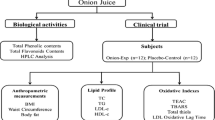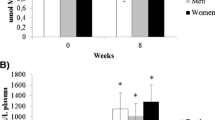Abstract
Hypercholesterolemia is known to be associated with enhanced oxidative stress related to increased lipid peroxidation. Several epidemiological and clinical studies have reported the benefits of consuming fruits and vegetables, leading to reduced risks for cardiovascular diseases and several types of cancers. Flavonoids are potential antioxidants found in foods such as onions. The aim of this study was to investigate the effect of decocted onion juice (about 300 g onion) supplementation for 10 weeks on antioxidant status in mild hypercholesterolemic subjects. Twenty-seven participants were studied in a randomized, single-blind, placebo-controlled, crossover design. Indices of antioxidant status used were plasma total antioxidant capacity, antioxidant vitamins, LDL oxidation, erythrocyte antioxidant enzyme activity, and leukocyte DNA damage. After 10 weeks of consuming decocted onion juice, there were no significant differences in all the tested parameters. In conclusion we failed to find any antioxidant effect of onion supplementation in subjects with mild hypercholesterolemia.
Similar content being viewed by others
References
Wald NJ, Law MR. Serum cholesterol and ischemic heart disease. Atherosclerosis 118: S1–S5 (1995)
Cox DA, Cohen ML. Effects of oxidized low-density lipoprotein on vascular contraction and relaxation: Clinical and pharmacological implications in atherosclerosis. Pharmacol. Rev. 48: 3–19 (1996)
Pritchard KA Jr, Groszek L, Smalley DM, Sessa WC, Wu M, Villalon P, Wolin MS, Stemerman MB. Native low-density lipoprotein increases endothelial cell nitric oxide synthase generation of superoxide anion. Circ. Res. 77: 510–518 (1995)
Keli SO, Hertog GL, Feskens EJM, Kromhout D. Dietary flavonoids, antioxidant vitamins, and incidence of stroke. Arch. Intern. Med. 154: 637–642 (1996)
Griffiths G, Trueman L, Crowther T, Thomas B, Smith B. Onions — A global benefit to health. Phytother. Res. 7: 603–615 (2002)
Lee HJ, Lee KH, Park E, Chung HK. Effect of onion extracts on serum cholesterol in borderline hypercholesterolemic participants. J. Korean Soc. Food Sci. Nutr. 39: 1783–1789 (2010)
Yang J, Meyers KJ, van der Heide J, Liu RH. Varietal differences in phenolic content and antioxidant and antiproliferative activities of onions. J. Agr. Food Chem. 52: 6787–6793 (2004)
Afanase’ev I, Dorozkho A, Broodskii A, Kostyuk V, Potapovitch A I. Chelating and free radical scavenging mechanisms of inhibitor action of rutin and quercetin lipid peroxidation. Biochem. Pharmacol. 38: 1763–1769 (1989)
Terao J, Piskula M, Yao Q. Protective effect of epicatechin, epicatechin gallate, and quercetin on lipid peroxidation in phospholipid bilayers. Arch. Biochem. Biophys. 308: 278–284 (1994)
Duthie SJ, Collins AR, Duthie GG, Dobson VL. Quercetin and myricetin protect against hydrogen peroxide-induced DNA damage (strand breaks and oxidised pyrimidines) in human lymphocytes. Mutat. Res. 393: 223–231 (1997)
Boyle SP, Dobson VL, Duthie SJ, Kyle JAM, Collins AR. Absorption and DNA protective effects of flavonoid glycosides from an onion meal. Eur. J. Nutr. 39: 213–223 (2000)
Park JH, Seo BY, Park E, Lee KH. Onion supplementation inhibits lipid peroxidation and leukocyte DNA damage due to oxidative stress in high fat-cholesterol fed male rats. Food Sci. Biotechnol. 18: 179–184 (2009)
Jakob E, Elmadfa I. Rapid HPLC assay for assessment of vitamin K1, A, E, and beta-carotene status in children (7–19 years). Int. J. Vit. Nutr. Res. 65: 31–35 (1995)
Rice-Evans C, Miller NJ. Total antioxidant status in plasma and body fluids. Method. Enzymol. 234: 279–293 (1994)
Ahotupa M, Marniemi J, Lehtimäki T, Talvinen K, Raitakari O, Vasankari T, Viikari J, Luoma J, Ylä-Herttuala S. Baseline diene conjugation in LDL lipids as a direct measure of in vivo oxidation. Clin. Biochem. 31: 257–261 (1998)
Marklund S, Marklund G. Involvement of the superoxide anion radical in the autoxidation of pyrogallol and convenient assay for superoxide dismutase. Eur. J. Biochem. 47: 469–474 (1974)
Beutler E. A Mannual of Biochemical Methods. Grune and Stratton, New York, NY, USA. pp. 71–73 (1984)
Aebi H. Methods of Enzymatic Analysis. Verlag Chemie GmbH, Weinheim, Germany. pp. 673–684 (1974)
Singh PN, McCoy MT, Tice RR, Schneider EL. A simple technique for quantitation of low levels of DNA damage in individual cells. Exp. Cell Res. 175: 184–191 (1998)
KCDCP. The 3rd Korea National Health and Nutrition Examination Survey (KNHANES IV), Korea Centers for Disease Control and Prevention, Osong, Korea (2007)
Moon JH, Nakata R, Oshima S, Inakuma T, Terao J. Accumulation of quercetin conjugates in blood plasma after the short-term ingestion of onion by women. Am. J. Physiol. -Reg. I. 279: 461–467 (2000)
O’Reilly JD, Mallet AI, McAnlis GT, Young IS, Halliwell B, Sanders TA, Wiseman H. Consumption of flavonoids in onions and black tea: Lack of effect on F2-isoprostanes and autoantibodies to oxidized LDL in healthy humans. Am. J. Clin. Nutr. 73: 1040–1044 (2001)
Edwards RL, Lyon T, Litwin SE, Rabovsky A, Symons JD, Jalili T. Quercetin reduces blood pressure in hypertensive subjects. J. Nutr. 137: 2405–2411 (2007)
Lean ME, Noroozi M, Kelly I, Burns J, Talwar D, Sattar N, Crozier A. Dietary flavonols protect diabetic human lymphocytes against oxidative damage to DNA. Diabetes 48: 176–181 (1999)
Beatty ER, O’Reilly JD, England TG, McAnlis GT, Young IS, Geissler CA, Sanders TA, Wiseman H. Effect of dietary quercetin on oxidative DNA damage in healthy human subjects. Brit. J. Nutr. 84: 919–925 (2000)
Park H, Oyunzul G, Suh SW, Park YS, Jang JK, Chung MS, Choi YJ, Shim KS. Investigation of functional ingredients from onion according to the extraction methods heat treatment and storage period. Food Eng. Progress 13: 92–98 (2009)
McAnlis GT, McEneny J, Pearce J, Young IS. Absorption and antioxidant effects of quercetin from onions in man. Eur. J. Clin. Nutr. 53: 92–96 (1999)
Hofmann T, Kuhnert A, Schubert A, Gill C, Rowland IR, Pool-Zobel BL, Glei M. Modulation of detoxification enzymes by watercress: In vitro and in vivo investigations in human peripheral blood cells. Eur. J. Nutr. 48: 483–491 (2009)
Giovannelli L, Pitozzi V, Luceri C, Giannini L, Toti S, Salvini S, Sera F, Souquet JM, Cheynier V, Sofi F, Mannini L, Gori AM, Abbate R, Palli D, Dolara P. Effects of de-alcoholised wines with different polyphenol content on DNA oxidative damage, gene expression of peripheral lymphocytes, and haemorheology: An intervention study in post-menopausal women. Eur. J. Nutr. 50: 19–29 (2011)
Author information
Authors and Affiliations
Corresponding author
Rights and permissions
About this article
Cite this article
Jeon, GI., Shin, MJ., Lee, KH. et al. Effect of onion juice supplementation on antioxidant status in participants with mild hypercholesterolemia. Food Sci Biotechnol 22 (Suppl 1), 227–231 (2013). https://doi.org/10.1007/s10068-013-0071-3
Received:
Revised:
Accepted:
Published:
Issue Date:
DOI: https://doi.org/10.1007/s10068-013-0071-3




